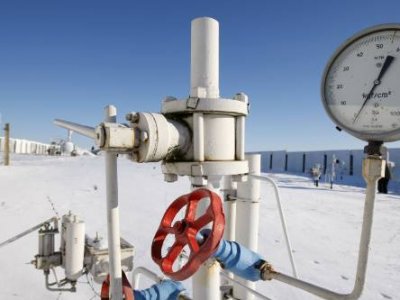
Russian “National Identity” and the Ukraine-EU Pipeline Deal
Publication: Eurasia Daily Monitor Volume: 6 Issue: 67
By:

Ukraine’s gas pipeline deal with the EU on March 23 led to an avalanche of Russian outrage that had less to do with the agreement, but exposed the Kremlin’s use of Russian national identity. Russia apparently felt ‘betrayed’ by Europe and Ukraine. Russian state-controlled media attacked its exclusion from the negotiations, maintaining that without Russia the modernization of the pipelines would not be viable, cast doubt on the viability of the plans and vilified the $5 to 7 billion promised by the EU as far too little. On March 23 Rossiya TV said the EU had forgotten that the pipelines are “mere junk without gas.”
Far more was involved than a show of anger over Moscow’s exclusion from the deal. On March 25 Rossiyskaya Gazeta claimed, “Europe does not want to see our country [as part of Europe] and sometimes does not even want to listen to it.” While Komsomolskaya Pravda noted that, “Europe wants to control our gas all by itself, so to speak. Russia has been assigned the role of a docile gas supplier, an appendix which possesses natural resources.” Elsewhere, the Russian media was no less critical, describing the EU and Ukraine as adopting a “disrespectful attitude towards [Russia’s] interests.” A report on Center TV International on March 28 concluded that, “Our European partners are incapable of being loyal on either geopolitical or economic issues” (Trud, Center TV International, March 25, 28).
The March pipeline deal also revealed the immaturity of Ukrainian domestic politics. Since mid-2008 Tymoshenko has been savagely attacked in Ukraine by the president and his secretariat because the prime minister was allegedly doing the bidding of Putin in return for Russian support in the presidential elections. They demanded the prosecutor’s office institute criminal charges of “treason” against her, which the prosecutor found insufficient evidence to warrant.
Fedor Lukyanov, editor of the Russia in Global Affairs journal, pointed out that one reason for Putin’s over-reaction was that he felt “betrayed” by Tymoshenko (Vremya Novostey, March 25). Putin was committed to the January gas agreement signed with the Ukrainian prime minister as the basis, “for building a political and energy partnership.” As a former FSB officer Putin knows that duplicity is central to the post-Soviet psyche. Tymoshenko explained the deal as protecting national interests and that she did not “betray” Russia. Instead Ukraine “has decently and clearly protected its main gas transit pipeline” (Ukrayinska Pravda, March 24). On March 29 Tymoshenko told Ukraine’s 1+1 TV, “One needs courage to defend Ukraine’s national interests and I have never backed the strategic aims of other countries to by-pass Ukraine with alternative pipelines and thereby leave our gas transit system without gas, without transit fees, without at a minimum $3 billion dollars each year for Ukraine’s economy.”
In February 2007, Tymoshenko mobilized 430 deputies to vote for a law that banned the sale, lease or rent of Ukraine’s gas pipelines. The move was a response to a threat by the Viktor Yanukovych government to create a Ukrainian-Russian consortium for the pipelines. Tymoshenko pointed out that, “I have always defended the gas transit system from dishonest privatization, from dishonest consortiums and knew that in doing so Ukraine is protected from being a geopolitical object of energy supplies to a direct partner and player” (1+1 TV, March 29).
Deputy Prime Minister Hryhoriy Nemyria (Tymoshenko’s unofficial “foreign minister” on her visits to the West) explained that Ukrainian politicians were wrong to portray Ukraine’s relations with Russia as a zero-sum game against its relations with the West. In fact, “the absence of a deep strategic analysis has made Ukrainian politicians uninterested in Europe, the USA and Russia” (Ukrayinska Pravda, April 2).
On March 26 a discussion between Ukraine’s Ambassador to Russia Kostyantyn Hryshchenko, shadow foreign minister in the pro-Russian Party of Regions, and Russia’s representative to NATO Dmitriy Rogozin on NTV showed that Russia’s over-reaction was a product of its inability to see Ukraine as a fully fledged independent state. In addition, the pipeline deal was evidence that Ukraine was continuing to distance itself from Russia. Rogozin, like most Russians, regards the Orange Revolution as Ukraine, “embarking on a course of splitting the East Slav world.” Russia had not criticized Ukraine for seeking EU membership until now because it had always been seen this as an unrealistic objective (unlike NATO membership which Moscow thought was imminent after Yushchenko’s election). Hryshchenko stated that Ukraine seeks good relations with Russia. NTV refuted this, saying it is not perceived in Moscow and said it was a “tragedy for Russia” that Ukraine, “does not want to be with us and instead they want to be in NATO, which means that our former neighbors and our fraternal countries do not believe in Russia, do not believe in its course and do not want to be part of it.”
Ukraine’s integration into the EU rather than into NATO (whose current expansion drive is stalled), might be raising fears in Moscow following Kyiv’s pipeline agreement and an imminent free trade agreement with the EU. These steps make Ukraine appear as a more realistic candidate for EU membership. Ironically, Tymoshenko and Nemyria might be more of a threat to Russia’s interests than Yushchenko as they both emphasize Ukraine’s priority as integration into the EU, which unlike possible NATO membership has popular support within Ukraine.




